There are a thousand and one distros to choose from if you’re seeking to switch to a new Linux distro but not all OSes are created equal.
Not all distros can provide you with a consistent workflow but KaOS can; And if you haven’t used this Operating System before then read on so that I can tell you why.
KaOS is a modern, open-source, beautifully designed, QT and KDE-focused Linux distro. It is a rolling release that ships with KDE Plasma as its default Desktop Environment, uses Pacman as its package manager, and has a 3-group structure repository on GitHub.
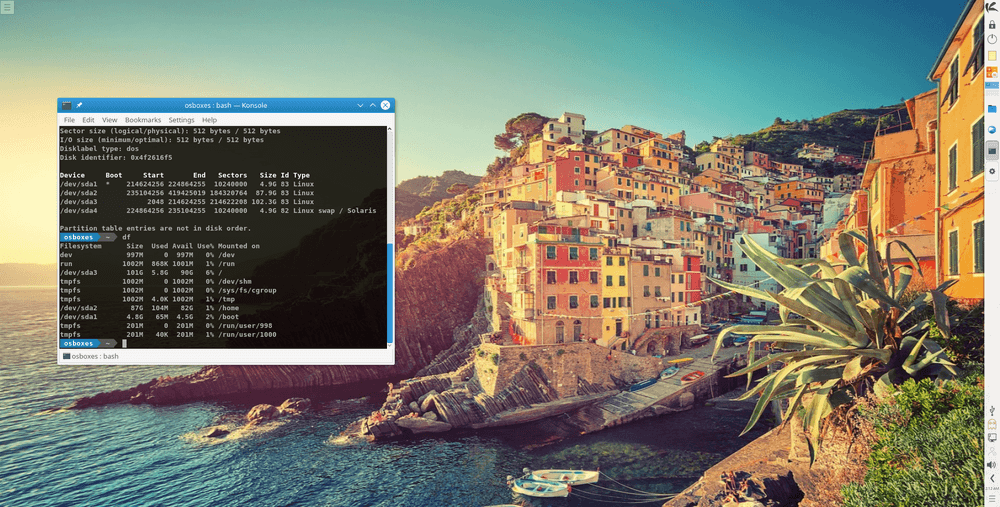
KaOS was first released in 2013 as an independent distro, i.e. it’s not based off of any other distribution. It adopted the KDE technology and has since focused on delivering content with better quality to its users over the years.
A typical example is its choice of package manager. Pacman was chosen so that KaOS users can easily build, adjust, and maintain the PKGBUILDs written specifically for KaOS.
With regards to its 3-group repo structure:
- “Core” contains the packages the system requires in order to boot-up.
- “Main” contains the system’s required libraries, extra drivers and firmware.
- “Apps” contains the apps, tools, and packages visible on the system.
The fact that it is a rolling release means that you will never need to worry about future updates the moment you have a version installed like in the case of Ubuntu and the like where you would need to consider whether to perform a clean installation of another “major version” or not.
KaOS always receives updates in the form of both minor changes (e.g. bug fixes) and major changes (new features, apps, and driver support).
According to the official website, KaOS,
has made the choice to use the Linux kernel as a base (…). After that choice, the best available package manager, most flexible way of package building, repository maintenance is pacman/makepkg for a rolling distro like KaOS.
As for the Desktop Environment, there will never be a change, whether it is Linux or Illumos based, KDE Plasma will be the choice, Qt the Toolkit.
With those choices in place, April 2013 package building for this independent distribution was started. KaOS is a build from scratch distribution, every package in every repository is build by and for KaOS.
To show how much of a cool idea the KaOS project was even when it was started, its initial goal of about 1500 packages was reached by the end of July 2013.
Learn a lot more about KaOS on its About page.
Main Features in KaOS
- KaOS is open for the world to download for free.
- You can contribute to the source code on GitHub where you can access its wallpaper packages, user modules, configuration wizard etc.
- A comprehensive Online Documentation with information on the tools and packages comprised in the OS.
- An online community where you can get support for using KaOS as well as discuss with other users.
- A news page to follow up on the latest moves the KaOS dev team is making.
- Pacman package manager.
- KDE and QT-focused with all packages built specifically for KaOS.
- Plasma 5 Desktop Environment.
- Elisa Music player.
- IsoWriter for making bootable flash drives.
- Nomad firewall app.
- Multimedia playback for mp3 and a host of various other media formats.
- Clamares Installer.
User Interface & Customizability
KaOS usually ships with the latest Plasma Desktop version (Plasma 5 at the time of writing) which automatically hints of a beautiful and customizable UI since it possesses all the features the popular desktop environment has to offer.
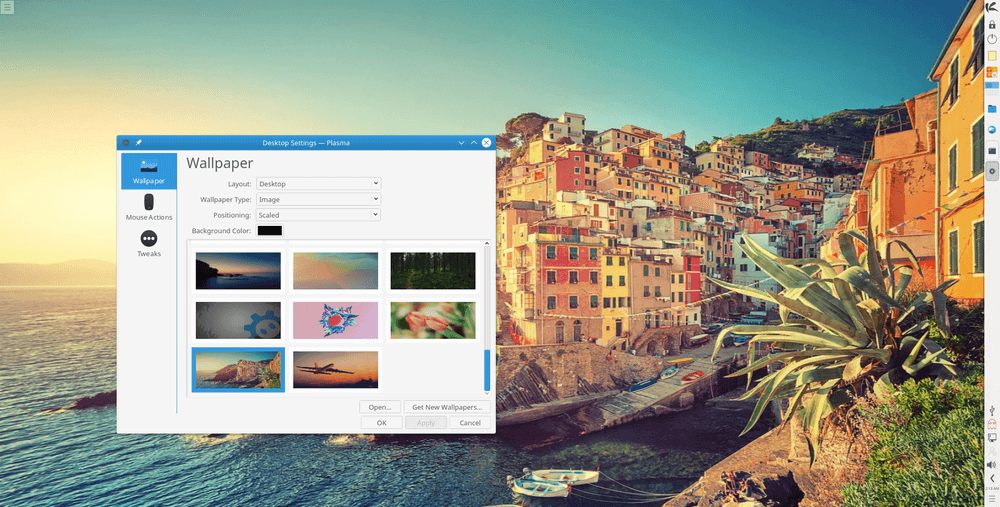
Its default theme is Midna, and users can opt to go for the darker version, Midna Dark. It also has inbuilt settings and widgets with which you change the system theme, icons, colors, animation effects, application styles, and screen edges.
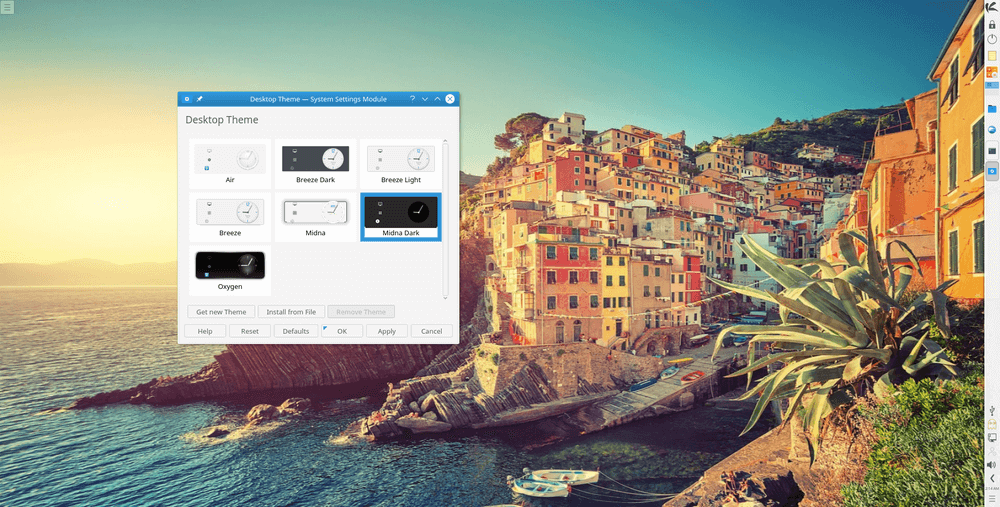
You can move the dock to different positions, hide icons, and place Plasmoids (Widgets in the Plasma desktop) to make your desktop look and feel more homely.
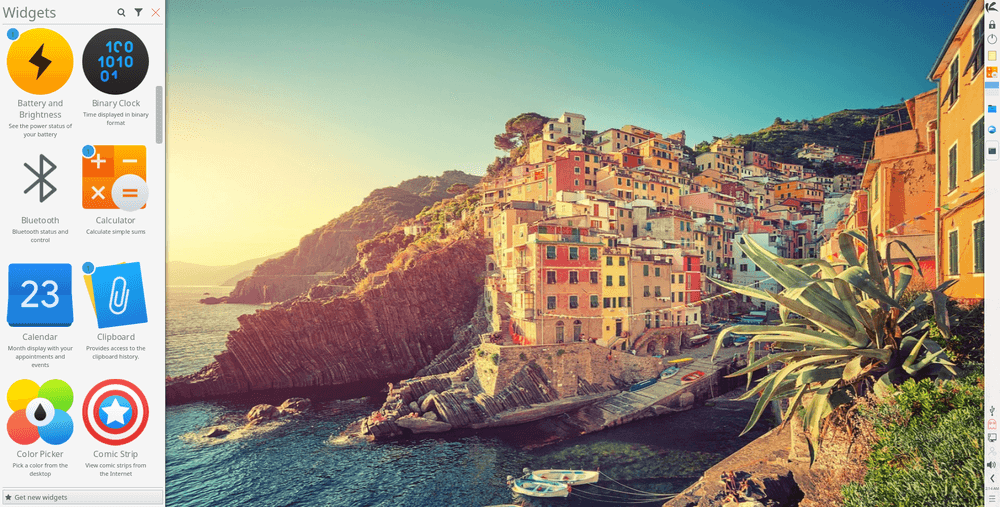
Basically, if you’re looking for a distro that is reliable, lightweight, and customizable, then KaOS is one of your best picks.
KaOS Default Applications
Just as one might expect, KaOS uses QT and KDE apps.
It ships with KDE’s Calligra office app suite – a KOffice spin-off that uses the OpenDocument format as its defaults file format. The office suite contains a host of applications you can use to create and manage notes, spreadsheets, drawings, flowcharts, databases etc.
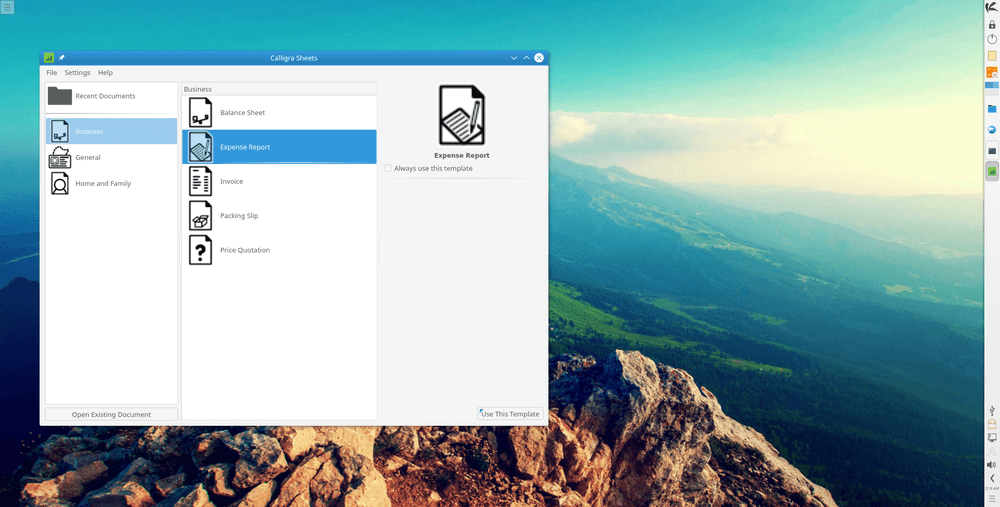
It also ships with Qupzilla web browser, Dolphin file manager, Okular document viewer, Simple screen recorder, SUSE Studio Imagewriter, Clementine player along with SMPlayer and mpv Media Player, and Pacman manager withOctopi as its GUI.
Pacman makes it easy to install apps since all you need to do is enter text into the search box, find the app you want, hit the green commit button and select yes to authenticate your installation.
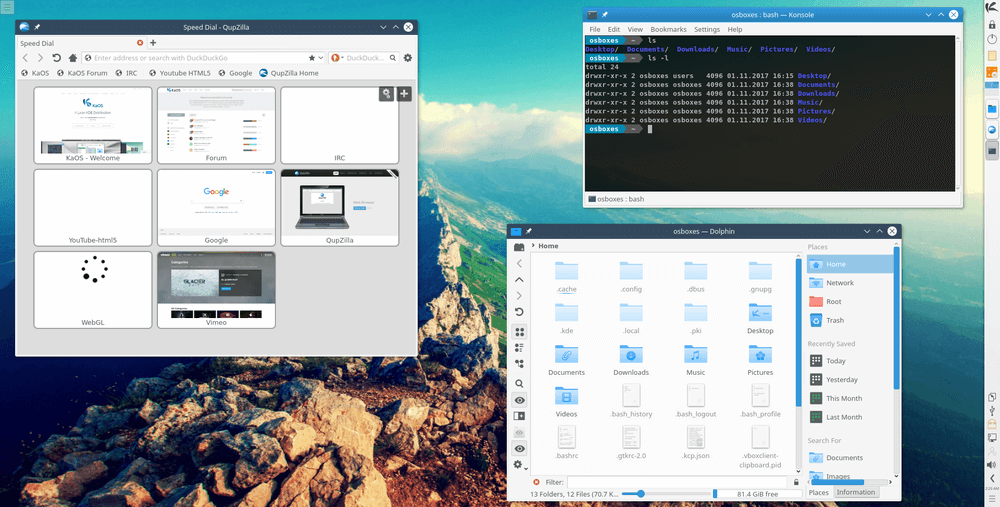
Mind you, all the apps available for KaOS have been actively developed by a dev team specifically for the OS so you don’t have to worry about compatibility issues and what not.
KaOS OS Installation
Installing KaOS is pretty straightforward and if you have installed other Linux distros before the process should be a breeze.
You will need a flash drive with a minimum of 4GB storage space and you can make it bootable with any of the ISO image writers we have posted on here before including WoeUSB, ISO Image Writer, Fedora Media Writer, and Etcher.
After making your flash drive bootable with KaOS ISO Image you can decide to try its live mode before installing on your workstation.
The KaOS ISO Image is also available for download in different methods including direct ISO and torrent from the downloads page. Just follow the button below:
[mks_button size=”medium” title=”Download KaOS ISO Images” style=”squared” url=”https://kaosx.us/pages/download/” target=”_blank” rel=”nofollow” bg_color=”#46698E” txt_color=”#fff” icon=”fa-download” icon_type=”fa” nofollow=”1″]
Ultimately, KaOS is responsive, focused, customizable, and elegant; especially since it sports one of the best KDE performances.
As an independent KDE distro it houses the Plasma desktop – and coupled with its focus on QT and KDE apps, it is easy for both beginners to the Linux distro world and pro users alike to function and customize efficiently.
What is your opinion about the project? And do you know of others we should give a try? Share your thoughts and experiences with us in the comments section below.

“Not all distros can provide you with a consistent workflow but KaOS can…” What do you mean? People usually mean something about the desktop experience by “workflow” but isn’t that the same as any other distro with Plasma Desktop?
Well, not all distros that run Plasma Desktop offer the same User experience. I’ve experienced a couple of Plasma desktop environments that glitch on some weird distros several times.
How independent is it? Doesn’t it draw heavily on Arch for its binaries?
Very interesting. I’ll try this distro. Thank you for your article!
Thanks Maurico! I’m glad you liked it.
Don’t forget to share to your interested acquaintances and to always come back for more reads like this.